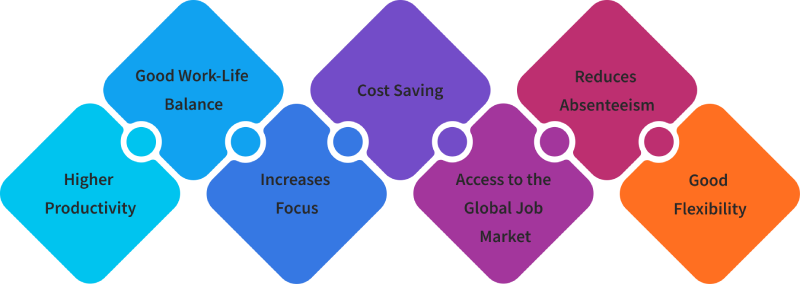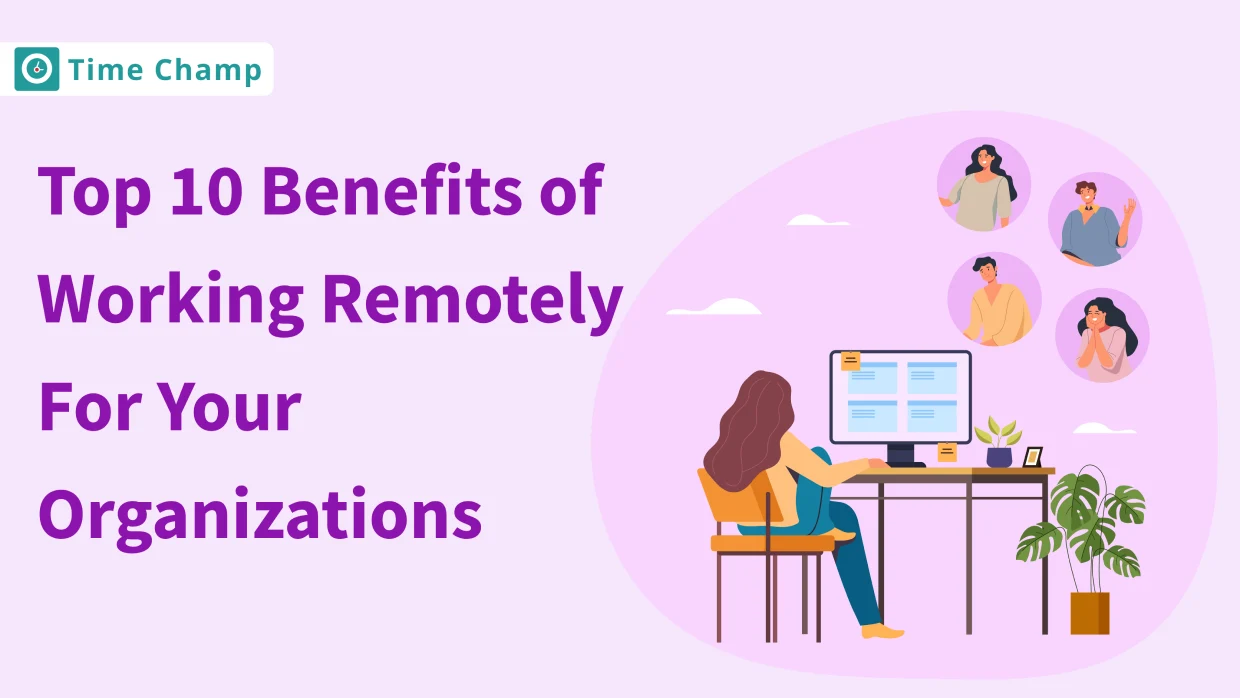What is Remote Work?
Remote work, also called working from home or telecommuting, is a way of working where employees do their jobs from outside the office. This is often done from home or other places, not the workplace. It uses technology like video calls, messaging apps, and online tools to help people work together, stay organized, and communicate with their teams and managers.
Why Remote Work is Becoming More Popular?
The workplace as we knew it has been
turned on its head, and remote work
is leading the charge. When the
COVID-19 pandemic hit, businesses
had no choice but to experiment with
working from home. What they found
was surprising: employees loved the
freedom and flexibility, and
companies saw productivity soar.
Swapping office commutes for home
offices gave people more time, less
stress, and a better
work-life balance, all while
keeping work on track.
Fast
forward, and remote work has become
more than a temporary fix like it’s
the future. Tools like Zoom, Slack,
and cloud storage make teamwork
easier, so businesses are adopting
this flexible approach. It’s no
wonder remote work is growing
rapidly. It’s simple, empowering,
and suits today’s way of life!
Benefits of Working Remotely

Higher Productivity
When employees are no longer tied to
a specific location, they are more
likely to have freedom and
flexibility, increasing
productivity. Since there
will be no distractions from a
traditional office environment, they
can work during their most
productive hours. This creates a
positive environment for them where
they put their best. When working
from home, employees can control
their tasks and schedule, which
helps them work faster and
better.
Not all companies let
employees pick their work hours,
many still offer flexibility in
terms of location or task
prioritization. This freedom helps
employees handle their work better,
so they finish tasks faster and
produce higher-quality work.
Additionally, the ability to avoid
commuting and work in a more
comfortable environment helps reduce
stress, which in turn keeps
employees focused and productive.
Good Work-Life Balance
Due to rigid office
work hours, there isn’t much
time for employees to spend on their
personal lives. However, remote work
provides a good work-life balance
for employees. Flexible locations
and schedules make it easier for
employees to support the
company’s growth and enjoy a
better balance in life.
Remote
work often means employees take
fewer sick days and feel happier.
They can take better care of
themselves, like eating healthy
meals at home or taking short breaks
to rest. This better balance between
work and personal life helps
employees stay happy, energized, and
more focused on their work. As a
result, they work better and feel
more motivated.
Increases Focus
Another good thing about remote work
is that it increases focus. When
employees work remotely, they can
avoid office
distractions, choose how to
set up their workspace, and plan
their day in their way. This keeps
them focused and allows them to do
more.
In addition, remote work
lets employees set up a workspace
that makes them feel comfortable and
focused. Whether it’s finding a
peaceful corner at home, customizing
their desk with personal items, or
even working from a cozy café,
employees can create a space that
inspires and excites them. This
freedom increases their morale and
makes them ready to plunge into
work. With less noise and the
ability to change where they work,
they stay focused and ready to do
their best work with new ideas.
Cost Saving
Remote work helps both employees and
employers save money in many ways.
Employees don’t have to spend on
things such as bus or train fares,
gas for their cars, parking charges,
etc. They can spend less money by
cooking their food at home.
For
employers, it’s also a win. You
don’t need to spend as much on
renting or maintaining office
spaces. Electricity, water, and
office supply bills are reduced. By
cutting these expenses, companies
save a lot of money while still
allowing employees to work
effectively from home. This
makes working remotely affordable
for everyone.
Access to the Global Job Market
Remote work lets companies hire talented people from anywhere in the world, no matter where they live. It breaks geographical barriers so that the employees get a chance to look for employment opportunities that suit their abilities and skills globally. This means businesses can find the best workers without worrying about location. A team from different areas brings new ways to think and solve things. It also helps companies understand and connect with more people and markets. This makes the team stronger, more creative, and ready to do well in today’s fast-paced world.
Reduces Absenteeism
If an employee is feeling slightly unwell, they are more likely to continue working from home. They don’t have to deal with the stress of traveling while sick and can rest as needed. Those with a long commute are often more likely to take a day off due to illness than those who can easily start work from another room in their home. This idea also applies to taking time off for appointments or events. When employees can plan their work schedule around personal tasks, they’re less likely to take unnecessary time off, helping them stay productive.
Good Flexibility
Working from home provides the flexibility to arrange their day in a way that works best for them, which helps to manage their lives. This makes it easier to take care of work and personal life. They can work around things like doctor’s appointments or family needs. Whether it’s picking up kids, going to an appointment, or taking a break, working from home helps manage time better. This makes employees feel they have control, which lowers stress and makes them happy. The freedom to balance work and life also helps them feel better and do their job better.
Environmental Benefits
A study published in the Proceedings of the National Academy of Sciences USA found that remote workers could have a 54% smaller carbon footprint compared to those who work in an office. This is mainly because they don’t have to commute, which reduces greenhouse gas emissions. Remote work also lowers energy use in offices, as fewer people working there means less electricity needed for lights, heating, and cooling. While remote workers might sometimes have a slightly bigger carbon footprint if they need extra space for a home office or other reasons, studies still show that remote work helps the environment by cutting down on commuting and office energy use.
Fosters Better Health and Wellness
One of the best things about remote work is how it boosts both physical and mental health. As there will be no longer a commute, employees will have more time to exercise, cook healthy meals, and get more sleep. Working from home also lets them create a workspace that suits them and pick their own schedule. This helps them feel less stressed, have more free time, and be happier and more focused at work.
Job Satisfaction
Recent
surveys indicate that 91% of
remote workers wish to keep working
remotely or in a hybrid model, and
76% believe their employer will
support remote work in the
future.
Who doesn’t love to
work from home?
Remote work
offers many benefits that make
employees happy and satisfied. It
allows employees to plan their day
in a way that suits them best,
giving them more control over their
time. This flexibility helps lessen
stress and enhances the balance
between work and personal life. When
employees are satisfied with their
jobs, they are likelier to stay
loyal to the company, work harder,
and perform better.
Challenges of Working Remotely

Longer Working Hours
Working longer hours is a common
problem while working remotely.
Extended work hours result from many
employees’ inability to
“switch off” at the end
of the day when there is no clear
boundary for exiting a workplace.
The convenience of working
from home can make it easy
to continue working late into the
evening or on weekends, which can
cause burnout over time. There will
be no separation between work and
personal time, which makes it harder
to relax.
Tip:
Setting clear work hours, creating a
dedicated workspace, and taking
regular breaks can help manage this
issue and maintain a healthy
work-life balance.
Communication Issues
A major problem with working from
home is communication
troubles. Working from home
mostly relies on emails, messages,
and video calls to talk. But
sometimes it can be confusing
because it’s hard to understand tone
or see facial expressions and body
language online. This can cause
errors and make it hard to talk
clearly or build good relationships
with others while working from
home.
Tip:
Provide tools for clear
communication, such as video calls
and messaging platforms. Encourage
clear messaging and regular
check-ins to keep everyone aligned
and reduce misunderstandings.
Technical Problems
Remote work is extensively dependent
on technology such as the Internet,
computers, and software. If the
internet is slow, a computer breaks,
or software doesn’t work properly,
it can stop work and cause delays.
These problems can cause frustration
as it makes it harder to get things
done. Since remote work needs
reliable technology, even small
issues can create big challenges for
employees.
Tip:
Give employees the right
tools and help them quickly
if something goes wrong. Offer
backup devices or internet to keep
things running smoothly.
Distractions at Home
Another challenge of working from
home is heavy distractions. It might
be family, pets, or household jobs,
etc. These are some of the
distractions that can hinder
performance as they impact
productivity most. Unlike an
office, where the environment is
mainly for work, home settings
usually have personal
responsibilities that pull attention
away. Managing both work and home
tasks can cause stress and make it
tough to do work
well.
Tip:
Help employees set up a quiet space
and reduce distractions at home. Let
employees choose their hours and
give tips to stay on task.
How Does Time Champ Help to Improve Your Remote Team Productivity?
Time Champ is a comprehensive tool that helps remote teams work better and stay productive. It allows you to track work with live screen monitoring, screenshots, and recordings, making it easy to see what the team is working on. With automated attendance, it records work hours automatically, even in offline or field locations, and creates accurate timesheets for hassle-free payroll.
With its task tracking, feature, you can see how much time employees spend on each task and help plan to work smoothly with reminders. Productivity reports give clear insights into team performance, while app and website tracking helps identify how employees spend their time during work hours. Time Champ makes it easy to keep remote teams focused, organized, and productive, helping businesses succeed.
Final Thoughts
In conclusion, remote work is rapidly spreading over the world, as it because it serves several good benefits for employees and organizations. Though it has advantages, some challenges must be solved to improve remote working. By following the tips discussed above, you can overcome those challenges and create a positive working environment.
Simplify Remote Work Management and Drive Results – Start Your Journey with Time Champ!
Signup for FreeBook DemoFrequently Asked Questions
Remote work keeps employees because it gives them flexibility, a better balance between work and personal life, and a cozy environment, which every employee dreams of.
Yes, it lowers stress by skipping long trips, giving a cozy workspace, removing rigid office politics, and letting employees decide their schedule for a better balance.
No, remote work isn’t ideal for all industries. Some jobs, like healthcare, factory work, or retail, need people to be there in person, so they are harder to do from home. But jobs in IT, marketing, writing, and customer service can be done easily from home.
Help new remote employees by sharing simple training materials, having regular meetings, and using video calls to meet the team. A buddy system can make them feel more comfortable.






